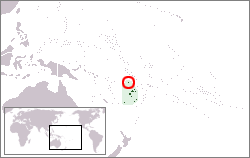Related Research Articles

Rotuma is a self-governing heptarchy, generally designated a dependency of Fiji. 'Rotuma' commonly refers to Rotuma Island, the only permanently inhabited and by far the largest of all the islands in the Rotuma Group. Officially, the Rotuma Act declares that Rotuma consists of Rotuma Island as well as its neighbouring islands, rocks, and reefs across the entire Rotuma Group. The dependency is situated around 500 km west of the French islands of Wallis and Futuna and a similar distance north of the Fijian mainland. Its capital is Ahau, a hamlet consisting of a number of colonial-era buildings. Rotuma exists as a dependency of Fiji but itself contains its own socioreligious pene-enclave known traditionally as Faguta where the chiefs and their villages adhere to the practices of worship, festival dates, and French-based writing system of the Marists. Faguta's special character was effectively agreed to by all Rotuma's chiefs in 1871 in the Treaty of Hamelin.
Haunani-Kay Trask was a Native Hawaiian activist, educator, author, poet, and a leader of the Hawaiian sovereignty movement. She was professor emerita at the University of Hawaiʻi at Mānoa, where she founded and directed the Kamakakūokalani Center for Hawaiian Studies. A published author, Trask wrote scholarly books and articles, as well as poetry. She also produced documentaries and CDs. Trask received awards and recognition for her scholarship and activism, both during her life and posthumously.

The Hawai'i International Film Festival (HIFF) is an annual film festival held in the United States state of Hawaii.
Rotuman, also referred to as Rotunan, Rutuman or Fäeag Rotuạm, is an Austronesian language spoken by the Indigenous people Rotuma in South Pacific. Linguistically, as well as culturally, Rotuma has had Polynesian-influence culture and incorporated as a dependency into the Colony of Fiji in 1881. The contemporary Rotuman language resulted following Samoan and Tongan incursions into Rotuma, which was initially inhabited by Tahitians.
Solkope is a small and densely wooded island off the southern coast of Rotuma in the Fiji Islands, at the edge of the fringing coral reef. It is separated from the main island of Rotuma by a channel that is between 50 and 200 m wide, and lies immediately southeast of the village of Kalvaka in the district of Noaʻtau. It 765 m long east–west, and up to 515 m wide, and rises to a height of 128 m. Its area is 0.3 km2. From the sea, it cannot be recognised as a separate island.

Albert Tuaopepe Wendt is a Samoan poet and writer who lives in New Zealand. He is one of the most influential writers in Oceania. His notable works include Sons for the Return Home, published in 1973, and Leaves of the Banyan Tree, published in 1979. As an academic he has taught at universities in Samoa, Fiji, Hawaii and New Zealand, and from 1988 to 2008 was the professor of New Zealand literature at the University of Auckland.
Dr John Charles Fatiaki is a career medical practitioner who was chosen by the Rotuma Island Council to be their representative in the Fijian Senate. He is the younger brother of former Chief Justice of Fiji Daniel Fatiaki.
The Rotumans are a Polynesian ethnic group native to Rotuma, an island group forming part of Fiji. The island itself is a cultural melting pot at the crossroads of the Micronesian, Melanesian and Polynesian divisions of the Pacific Ocean, and due to the seafaring nature of traditional Pacific cultures, the indigenous Rotuman have adopted or share many aspects of its multifaceted culture with its Melanesian, Micronesian and Polynesian neighbours.
The Land Has Eyes is a 2004 Rotuman film written and directed by Vilsoni Hereniko. It is the first ever feature film from Rotuma.
Sapeta Sokag‘aitu Taito is a Fijian actress. She played the lead role in Fiji's first feature film, The Land Has Eyes, in 2004.
Fiji only began producing its own feature films in 2004, and has produced just one to date. Vilsoni Hereniko's The Land Has Eyes (2004) is set in Rotuma and stars indigenous Rotuman actress Sapeta Taito in her début role, alongside New Zealand actress Rena Owen.
Grace Mera Molisa was a Ni-Vanuatu politician, poet and campaigner for women's equality in politics. The Australian described her as "a vanguard for Melanesian culture and a voice of the Vanuatuans, especially women". She has also been described as one of the Pacific's "leading public intellectuals and activists".

Teresia Teaiwa was a distinguished award winning I-Kiribati and African-American scholar, poet, activist and mentor. Teaiwa was well-regarded for her ground-breaking work in Pacific Studies. Her research interests in this area embraced her artistic and political nature, and included contemporary issues in Fiji, feminism and women's activism in the Pacific, contemporary Pacific culture and arts, and pedagogy in Pacific Studies. An "anti-nuclear activist, defender of West Papuan independence, and a critic of militarism", Teaiwa solidified many connections across the Pacific Ocean and was a hugely influential voice on Pacific affairs Her poetry remains widely published.
Among the first published works of Fijian literature, in the late 1960s and early 1970s, were Vivekanand Sharma, Raymond Pillai's and Subramani's short stories and Pio Manoa's poetry. The emergence of Fiji's written literature coincides with the country's transition to independence in 1970.
Ronald Gordon Crocombe was a Professor of Pacific Studies at the University of the South Pacific. His reputation was such that he was described as the "father of Pacific Studies".
Rugby union in Rotuma is a major sport. Rotuma is a dependency of Fiji, although one with a distinctive culture and language, more related to its neighbours in Tonga and Samoa.
The Wairoa Māori Film Festival is New Zealand's premiere Māori and indigenous film festival.
The Center for Pacific Islands Studies, in the University of Hawaiʻi at Mānoa School of Pacific and Asian Studies, is both an academic department and a research center on the Pacific Islands and issues of concern to Pacific Islanders. Its instructional program is regional, comparative, and interdisciplinary in nature.

Subramani is a Fijian author, essayist, and literary critic. According to The Literary Encyclopedia, he is "one of Fiji's leading prose fiction writers, essayists, and critics". His essays have dealt with multiculturalism, education, and cinema. Subramani writes fiction and non-fiction in English and Fiji Hindi, and has combined writing with university administration. He has served in all three universities in Fiji and has been a Dean, Pro Vice Chancellor and Acting Vice Chancellor. He has established himself as a novelist, short story writer, essayist and a literary critic. He has written on education, language, the university, cinema and civil society. In his fiction, as a bilingual writer, and working from the intersection of two languages, he been able to depict, in the words of the Samoan novelist, Sia Figiel, the "struggles of Fijian society and present us with a haunting salusalu of melancholy, despair, anguish, madness, terror, loss interlaced with moments of satire and humour that encapsulates the history and experience of men and women and children caught up in the violent shadow of colonialism".

Solnohu or Sol Nohu, also known as Solnoho, Solnahu and Solnahou, is a small crescent-shaped uninhabited island in the Rotuma Group of Fiji. The island is of special importance in Rotuman and Tongan funerary customs.